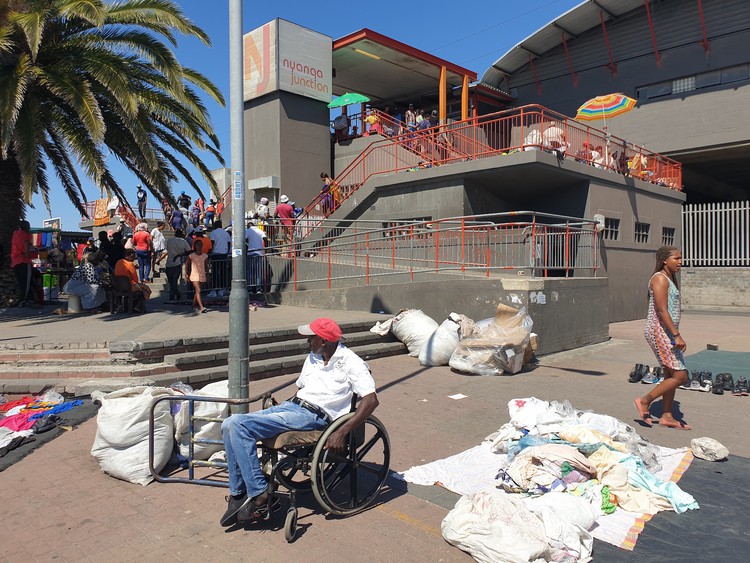Commuter Lunga Zawa uses a wheelchair. But Nyanga station is only accessible by stairs
Cape Town Association for the Physically Disabled has been fighting since 2015 for better access
Gugulethu commuter Lunga Zawa uses a train daily to get to work. But at Nyanga Junction station he has to ask someone to carry him and his wheelchair up the stairs. Zawa is paraplegic.
“Imagine needing to hire someone when you want to use public transport,” he says.
When GroundUp visited the station, amaphela (private car taxis offering shared rides) were dropping and picking up passengers, and crowds of people were walking up the steps making their way to the train station. A young child ran through the crowd, chased by a man who said the child had just stolen something from his food stall.
Zawa was headed for the station, but because he is in a wheelchair, going up the steps which lead to the station, is a problem. Then he has to get to the platform. Nyanga Junction station has openings on two sides, the Gugulethu side and the Manenberg side. Although there is a short ramp on the Gugulethu side, it does not go all the way to the top. Both sides have steps and are inaccessible to wheelchair users. The station does have lifts, but they do not work.
“From leaving my house it becomes a mission. I have to catch iphela to take me to the station. And I can get myself inside the taxi, but I still need someone who will undo the wheels of my wheelchair and fold it to get it into the boot of the taxi.”
“I do get the random taxi driver who will be rude to me and refuse to assist me, but most of the time, they are helpful. Then when I get to the station the first stumbling block is getting on to the pavement. Once that is achieved, I am faced with the steps to the actual station where I catch a train,” says Zawa.
He asks friends to accompany him or pays someone around R20 to help. He says he needs two people, one to carry him up the steps and the other to carry his wheelchair.
Zawa, who works as a peer supporter at the Cape Town Association for the Physically Disabled in Bridgetown, became a paraplegic after a car accident in 1991.
“I am very independent,” he says. But, he says, access to public transport for disabled people “is a war we have been trying to win for ages now”.
“We have had marches about this issue, even a march right here by Nyanga Junction station, but we received no response to our demands. And when you are not responded to, you just lose hope that anything will change,” said Zawa.
Interviewed by GroundUp in 2017, Metrorail spokesperson Riana Scott acknowledged that the South African rail commuter system was not yet “universally accessible” and said new trains would have universal access for people with disabilities, including wide access doors, and doors which automatically open and close. The first trains in the new fleet were expected in Cape Town in 2019/20, she said.
Asked for an update, Scott said, “The first trains in the new fleet are expected in Cape Town in 2020 onwards.”
Asked whether there were any plans to make stations like Nyanga Junction more accommodating for people with disabilities, Scott referred GroundUp to Kaparo Molefi, from PRASA Corporate Real Estate Solutions, who did not respond to our questions.
Belinda Lewendal from the Cape Town Association for the Physically Disabled said the association had been fighting for better access to public transport for people with disabilities since 2015.
“Metrorail had a discussion with our organisation in 2015. They wanted input because they were planning to run a pilot project on accessibility to trains for people with disabilities.
“We gave so much input, like having assistants on the trains, lifts and ramps at the stations and on the trains, but none of that came to fruition.”
“The sad part is that not only Nyanga Junction station is like this. I remember one of our board members, who is blind, telling us what a nightmare it was using a train at Athlone station. The train was so full and the board member had a constant fear of being pushed out of the moving train,” said Lewendal.
Support independent journalism
Donate using Payfast

Next: Muizenberg: Where South Africans play together
Previous: Gay activist stages pop-up theatre in city streets
© 2019 GroundUp.
This article is licensed under a Creative Commons Attribution-NoDerivatives 4.0 International License.
You may republish this article, so long as you credit the authors and GroundUp, and do not change the text. Please include a link back to the original article.

